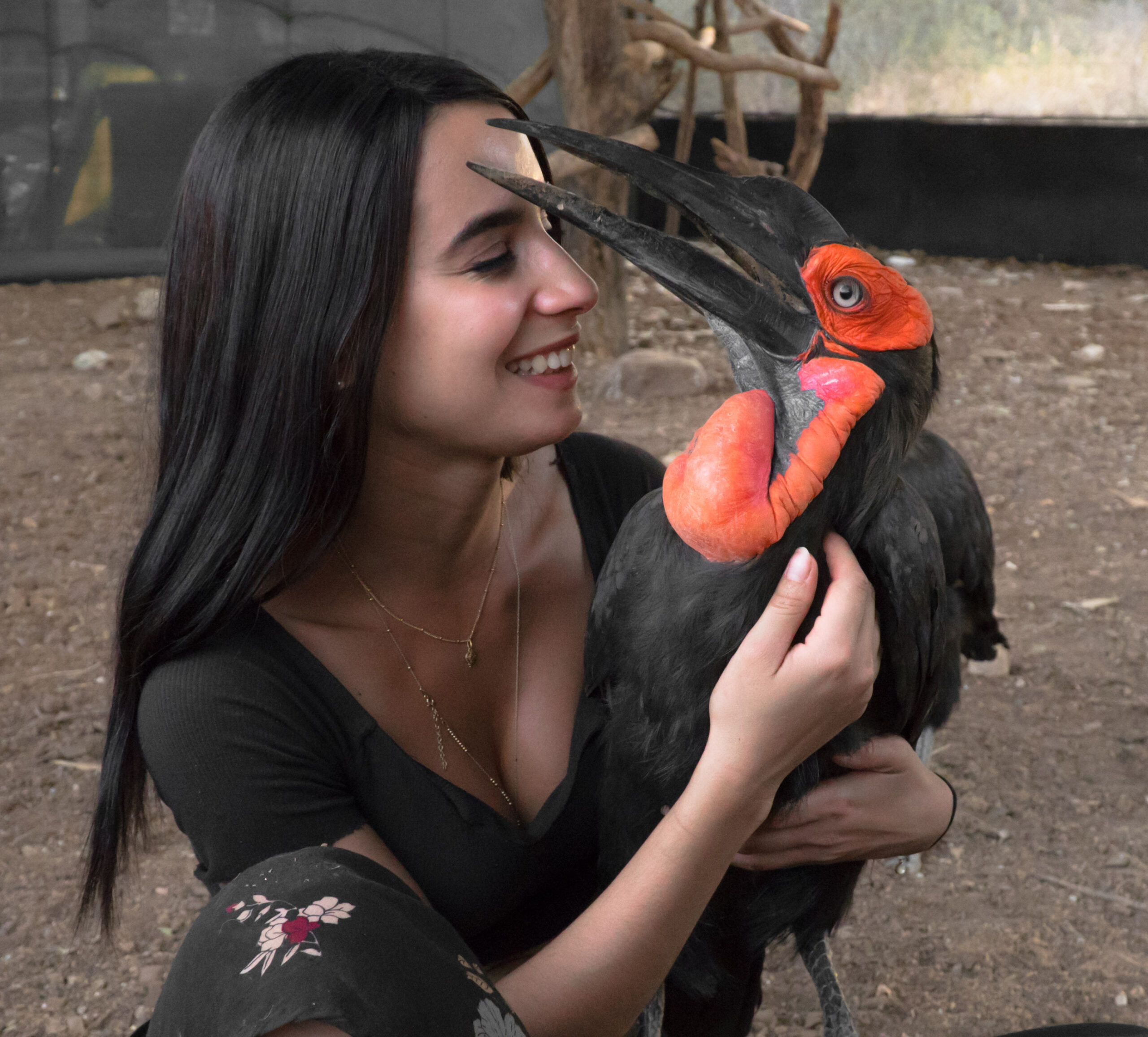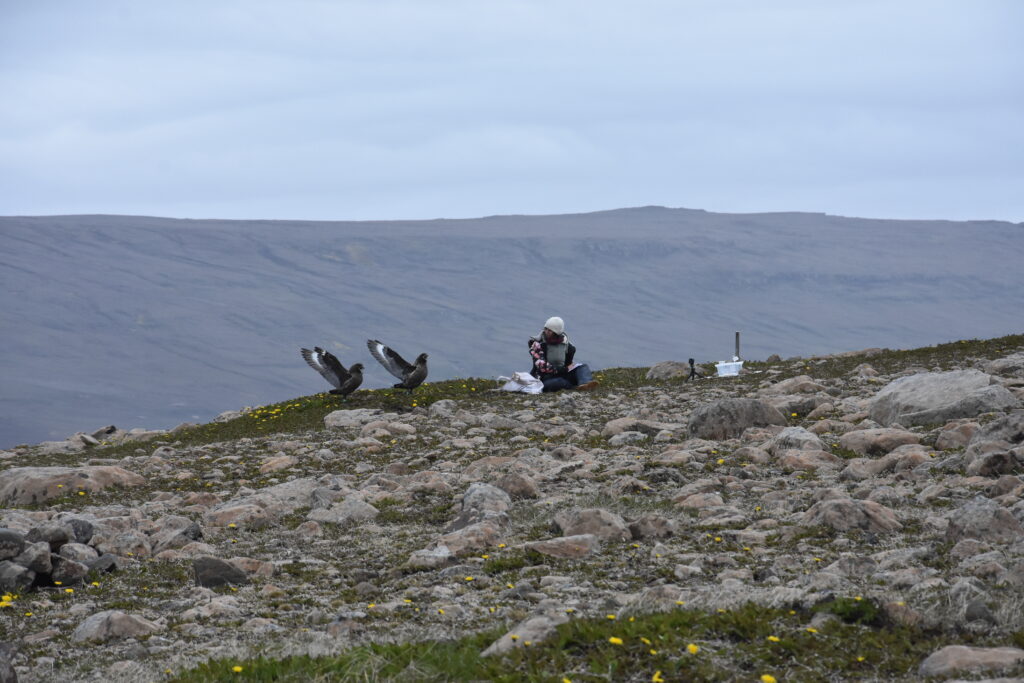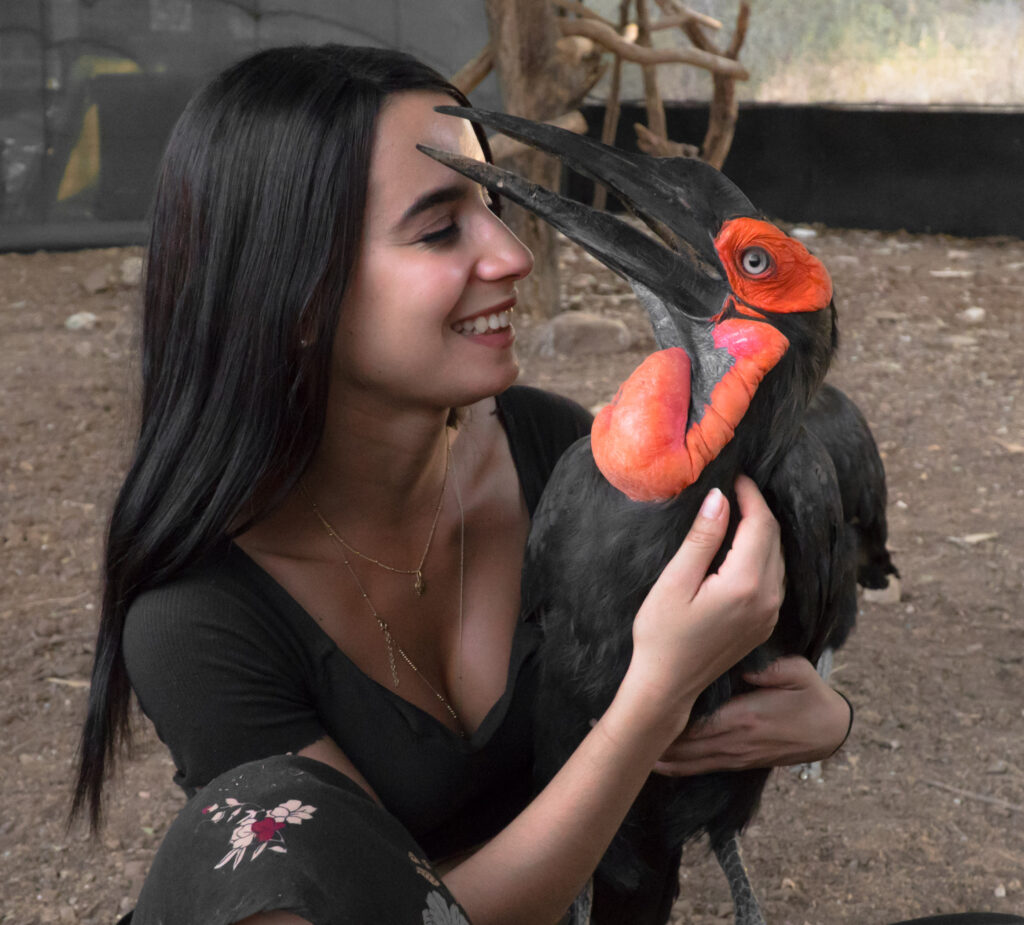
Photo Credit @Samara Danel
Feathered Friends and Scientific Passion: Dr Samara Danel on Unravelling the Cognitive World of Birds
In the series “33 questions” we introduce, in no particular order, our WiRe Fellows who are currently working on a research project here at the University of Münster. Why 33? Well, if we think of the rush hour of life, it is kind of the age that lies in the middle. And we also like the number😉.
In today’s episode we are speaking with Dr. Samara Danel, a dynamic researcher from Argentina, who balances her passion for the environment with the joys of motherhood. Her WiRe research project concentrates on alternative business models for circular bioeconomy in Argentinean agro-industrial value chains.
1. What motivated you to work in the field of avian cognition?
When I was 15, I rescued a feathered friend, with whom I developed a strong social bond. I realized soon enough that he was behaving in a ‘cognitive’ way, recognizing me from other people and adapting his behaviour flexibly depending on circumstances. This made me completely cuckoo about avian behaviour. However, at that time, no communication and little information were available about a cognitive ethologist’s career path. I was also highly disheartened by career advisers who told me that I will necessarily fail. After some research, I found out how to study avian cognition. I thus quit my preparatory class to go to university, and a long exciting – but challenging – marathon started…
2. Describe your work in three words.
Passion, Challenge, Freedom
3. Describe your research topic in three words.
Understanding cognitive evolution
4. A good researcher in animal cognition needs…?
… to be curious like sheathbill, bold like a penguin, provident like a magpie, and persistent like a female skua.
5. What does a typical (work) day look like for you?
During fieldwork, a typical day involves getting up early to prepare materials for the experiment, and then leaving to look for birds. As soon as the focal bird is in view and willing to participate in the experiment, I propose a problem to solve – e.g., lifting a box’s lid to reach a food reward. Then, when all tests are ‘in the bag’, I come back to the office, transfer to a hard disc the videos collected, and prepare the next day of testing

6. What is the best experience you have had as a scientist / researcher?
I have always loved working with birds, but my expedition to remote sub-Antarctic Islands in 2019 was particularly revealing at the professional level. At that time, I was not familiar with fieldwork, except for one previous experiment conducted on semi-wild donkeys. During the experimental period at Kerguelen Islands, we were only two human living souls left on an island of about 1 km in diameter. No Internet and no phone: just birds. Every morning, I was lucky to study the behaviour of skuas and sheathbills. It was such a pleasure to work with these peculiar birds, that when I went back to homeland I just I could not stop working. This experience strengthened my vocation, and would never have been possible without the trust and kindness of my Director, Francesco Bonadonna.
7. What was your biggest research disaster? What did you learn out of it?
I think all researchers are familiar with the joys and disappointments of research project applications. After spending almost days and nights thinking and writing about a research project you are passionate about, you hear that it has been rejected. With time, you learn resilience, and to put things into perspective.
The long-term position application process is also suffocating, because of extremely high competition and system opacity. A way to feel better is to create your own options, that way all your eggs aren’t in one basket. Indeed, there are a number of ways to pursue your passion as a researcher. Knocking on new doors may be worth a try.
8. What keeps you motived in your work day in and day out?
The desire to move forward, including writing articles, learning about new discoveries and research, and thinking about on-going and new projects.
9. What is your favorite research discipline other than your own?
History 🙂
10. How did you survive your PhD time?
By creating an environment where I could be 100% focused. I was lucky to have a supervisor who trust me and did not reproach me for my independence.
11. What was the funniest moment you had in science?
I have plenty, birds are very fun to work with. When I was working at a zoo in South Africa, I remember a nice and tame female ground-hornbill. During most trials (to get a food reward, birds had to choose one specific container among several), she approached me, sat next to me for a pet, and then fell asleep! Not very useful. Indeed, as we quote in the field: ‘Lack of evidence is not evidence of absence’. My girl’s boyfriend was not better: to test him, I had to stroke him continuously, then put the containers on the ground, and quickly stroke him again so that I could safely exit the aviary. Why? If I stopped petting him: he went cuckoo and attacked me!
12. What advice and tips do you have for future PhD students?
Working hard, being patient, and withstanding pressure are useful. However, you are not a bee and, in the long run, reaching your goals by giving up your life is not a good option. Thus, although it may seem logical at first glance, do not forget to take time to enjoy life. Also, explore your options! And don’t be afraid to make your own luck by connecting with kind people. Also, during my PhD, I worked in a zoo and was thus a bit isolated from the academic field. At the beginning, I lost time and energy in conducting an experiment using a sample size that was too low. I was blinded by the species’ atypical ecological characteristics and social structure. Independence is good, because you can go forward, but you are also more prone to time-consuming trial-and-error learning. It is thus important not to be afraid to bother mentors and colleagues when you need advice. You will save considerable time and energy by benefiting from experience-based, constructive recommendations.
13. What direct or indirect relevance does your research have for society?
The indirect relevance of our research field is to understand the cognitive processes underlying animal behaviour. This includes, for instance, whether and how animals learn new behaviours by observing cons- and/or heterospecifics. Useful applications result from these fundamental studies. For example, captive juvenile New Zealand Robins (Petroica australis) can be taught to fear predators by associating the presentation of a model predator with distress calls of conspecifics. Importantly, fear behaviour can spread across populations and transmit between generations, ensuring protection in the long term. One of the most urgent conservation issues also concerns human-wildlife conflicts. For instance, in Southern ground-hornbills (Bucorvus leadbeateri), if a bird sees its reflection in a shiny surface (a window, shiny car or other reflective infrastructure) it attacks this reflection as if it were an intruder. This leads to much damage, with groups breaking over 400 windows in a morning. Unfortunately, this maladaptive behaviour results in the decline of this endangered species. In 2019, we have repeatedly presented unbreakable mirrors to captive ground-hornbills to assess whether they stop attacking their own reflects after a number of exposures. This simple non-associative learning mechanism is known as ‘habituation’. If ground-hornbills do habituate and transfer learning to other reflective surfaces, then this would represent a promising approach to prevent local extinction of populations.
14. How did you imagine the life of a scientist / researcher when you were a high school student?
It depends on the disciplines. I imagined biomedical researchers as wearing white coats and working primarily in a lab environment. Fieldwork, especially in exotic locations, was more associated with researchers in anthropology or paleontology.
15. Is it actually different? In what way?
Completely, researchers spend time mostly at their office, reading and writing manuscripts.
16. What do you like most about the “lifestyle” of a scientist / researcher? And what least of it?
I like the work independence and the freedom of thought. You don’t need to be reminded to work, you work. What I find sometimes a bit tiring are the pressure and guilt associated with this lifestyle

17. Do you think your career would have evolved differently if you were a man?
I don’t think so. However, when I engaged in this career path, I remember someone I like very much telling me that I would never succeed if I have children. During my third post-doctoral fellowship, I took my 1 year-old baby with me to the United States. I was able to work and support my family. Since then, I think he changed his mind.
18. Where do you see yourself in 10 years?
I have explored different options, which are not numerous in the field of animal cognition. In ten years, I hope to be in a long-term position, removing the pressure to find the next funding opportunity. However, I know one thing: this career path results from an inexhaustible passion: I will find a way to pursue my vocation!
19. If you had a daughter, what would you advise her not to do?
Listening to others unquestioningly. Hearsay is zero degree of thought. Of course I am not saying that it is not wise to listen to others and follow advices, but free will and independent thinking are crucial.
20. How would you explain your research area and topic to a child ?
Animal cognition is what animals understand about their world. However, animals do not speak and cannot tell us what they ‘think’. A common way to get around this is to propose them problems to solve. For instance, let’s say you present simultaneously two opaque buckets to an animal (your dog/cat/bird): you put a treat in the right one, but you leave the left one empty. Subsequently, you show the content of both buckets to the animal, by inclining them towards him/her. Then, you let the animal put her/his head inside one of the two buckets. If she/he chooses the ‘good’ bucket (the right one), he can eat the treat. However, if he chooses the left empty bucket, you do not give her/him the treat and you repeat the process again. After many repetitions, you present the buckets once again but without showing their contents. If the animal chooses the right bucket, you know that he has learned something new about her/his environment (i.e., that the right bucket contains a treat).
21. What is the biggest challenge for you when it comes to balancing family and career?
To avoid feeling overwhelmed.
22. How do you keep your head clear when you are stressed?
Making my child laugh and doing sports.
23. How do you master challenges?
Anticipation and Organization are keys.
24. How often do you as a friend / partner / mother / daughter feel guilty when you have to meet a deadline – again?
Often, but less than before being a mother. With time, you learn to accept this burden and put things into perspectives.
25. How did you imagine your future as a child? What profession did you want to pursue?
I could not imagine myself having a profession since I had very bad grades. To be honest, I loathed school. However, I really enjoyed sport, theater, and violin. A short time afterwards, birds cleared up everything.
26. Which of your traits bothers you the most in your daily work?
Mental block over details, and switching off from work.
27. And which of your traits help(s) you the most in your daily work?
Passion.
28. What worries you most about the world?
Our species’ prepotent desire to always look for progress at our expense.
29. Which hobby have you given up for a life in academia?
I certainly have less time to practice to sew, draw, make documentaries, and even read.
30. If you could travel in time: in which epoch and at which discovery or event would you have liked to have been there?
Oulala. Tough question. I think the best memories are those that collectively transfix by wonder. For instance, I would like to have been there when people replaced candles by incandescent lamps, letters by telephones, or carts by cars. In the field of avian behaviour, I would like to have been present when molecular tools revealed that, in socially monogamous birds, most females were unfaithful! Some (male) scientists just refused to believe it.
31. What are the advantages and disadvantages of doing a remote-WiRe-fellowship?
The total freedom to combine work and family obligations, by focusing fully on your research while staying close to your family. The disadvantages are of course the lack of day-to-day rich interactions with peers.
32. What is your favorite place to relax from research?
Under water.
33. If you could change one thing about the academic system in which you have last done research in, what would it be?
Less precarity for young researchers, more communication about funding opportunities, and transparency after applications to long-term positions.

